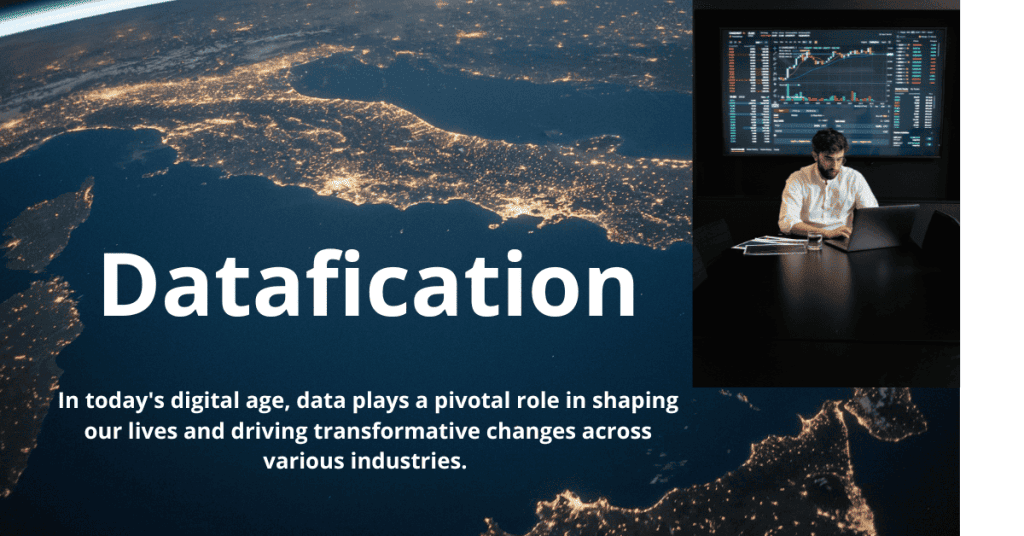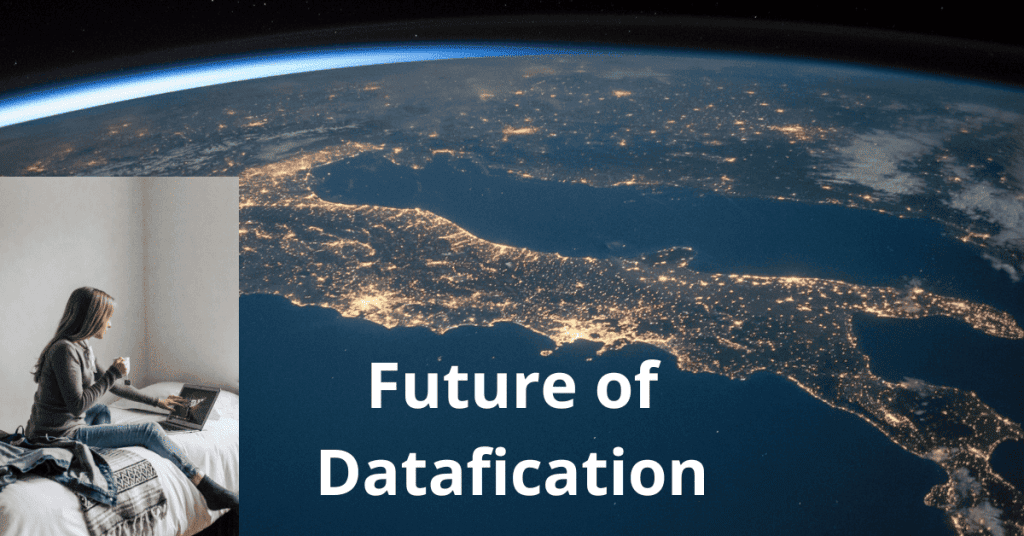Last Updated on January 23, 2024 by Gavi
In today’s digital age, data plays a pivotal role in shaping our lives and driving transformative changes across various industries.

From businesses and healthcare to education and government, the concept of datafication has gained immense importance.
In this article, we will explore what datafication entails, why it is essential, its applications in different sectors, the challenges it presents, and its future prospects.
Datafication Introduction
The rapid advancements in technology and the widespread adoption of digital devices have resulted in an unprecedented explosion of data.
Datafication refers to the process of capturing, analyzing, and utilizing data to derive meaningful insights and make informed decisions.
It involves the transformation of various aspects of our lives into data, enabling us to understand patterns, trends, and behaviors that were previously hidden.
1. What is Datafication?
Datafication is the process of converting diverse forms of information into a digital format, making it amenable to analysis and utilization.
It involves the collection, storage, and analysis of vast amounts of data generated from multiple sources, such as social media, sensors, transactions, and user interactions. At its core, what is Datafication? It is about extracting meaningful value from the vast amount of data available in today’s digital landscape.
By leveraging technologies like big data analytics, machine learning, and artificial intelligence, datafication empowers organizations and individuals to extract valuable insights and create data-driven solutions.
Datafication is the process of converting all aspects of our world into data or digital information.
It refers to the rise of data-driven decision-making and the use of data analytics to solve real-world problems.
Datafication has become an integral part of our lives, and it influences various aspects of our lives from healthcare to finance, from retail to transportation.
2. The Importance of Datafication
Datafication has become crucial in today’s highly interconnected world. By harnessing the power of data, organizations can gain a competitive edge, optimize their operations, and enhance customer experiences.
From personalized recommendations on e-commerce platforms to targeted advertising campaigns, datafication enables businesses to understand customer preferences, predict trends, and tailor their offerings accordingly.
Moreover, datafication plays a vital role in scientific research, enabling researchers to analyze large datasets and uncover new discoveries.
In healthcare, datafication facilitates precision medicine, where treatment plans are tailored to individual patients based on their genetic profiles and medical histories. What is Datafication? It is the transformation of data into valuable insights that drive informed decision-making and innovative solutions.
In education, data-driven insights help educators identify students’ strengths and weaknesses, allowing for personalized learning experiences.
3. Applications of Datafication
3.1 Business and Marketing
Datafication has revolutionized the way businesses operate and market their products or services. Through data analysis, companies can understand consumer behavior, identify target markets, and refine their marketing strategies.
By leveraging customer data, businesses can create personalized experiences, improve customer satisfaction, and drive customer loyalty.
Additionally, datafication helps in inventory management, supply chain optimization, and fraud detection.
3.2 Healthcare and Medicine
The healthcare industry has witnessed significant transformations due to datafication. Electronic health records, wearable devices, and genetic sequencing have generated massive amounts of data.
Healthcare professionals can leverage this data to enhance patient care, improve diagnosis accuracy, and develop personalized treatment plans. Data-driven insights also enable epidemiologists to track and respond to disease outbreaks effectively.
3.3 Education
Datafication is reshaping the education sector by providing valuable insights into student performance, engagement levels, and
learning patterns. Educators can utilize this data to identify areas where students may need additional support, develop targeted interventions, and personalize learning experiences.
Furthermore, datafication facilitates administrative tasks, such as managing student records, tracking attendance, and assessing program effectiveness.
3.4 Government and Public Services
Governments are increasingly relying on datafication to enhance public services and decision-making processes.
Data analytics enables policymakers to identify social, economic, and environmental trends, leading to more effective resource allocation and policy implementation.
Furthermore, data-driven governance helps in addressing issues like traffic management, urban planning, and emergency response.
4. Challenges of Datafication
While datafication offers immense opportunities, it also presents significant challenges that need to be addressed.
4.1 Data Privacy and Security
The collection and analysis of large volumes of personal data raise concerns about privacy and security.
Organizations must implement robust data protection measures to safeguard individuals’ sensitive information and prevent unauthorized access or breaches.
4.2 Ethical Considerations
Datafication raises ethical concerns surrounding consent, transparency, and the responsible use of data.
It is crucial to establish ethical frameworks and guidelines to ensure that data-driven practices respect individuals’ rights and do not perpetuate biases or discrimination.
4.3 Data Quality and Bias
Datafication heavily relies on the availability of accurate and representative data. However, data quality issues, such as incompleteness, inaccuracy, and bias, can undermine the reliability and fairness of data-driven insights.
Ensuring data integrity and addressing bias is essential for effective datafication.
5. Future of Datafication

The future of datafication holds great potential. As technology continues to advance, datafication will become even more pervasive across industries.
Innovations like the Internet of Things (IoT) and 5G networks will generate vast amounts of real-time data, enabling more sophisticated data analysis and predictive capabilities.
However, addressing the challenges associated with datafication, such as privacy concerns and ethical considerations, will be crucial for its sustainable growth and positive impact.
What is Datafication: Conclusion
Datafication is transforming the way we live, work, and interact with the world. By harnessing the power of data, organizations can unlock valuable insights, make informed decisions, and drive innovation.
FAQs
How does datafication benefit businesses?
Datafication enables businesses to gain insights into customer behavior, optimize operations, and create personalized experiences, ultimately leading to increased customer satisfaction and loyalty.
What role does datafication play in healthcare?
In healthcare, datafication improves patient care by enabling personalized treatment plans, enhancing diagnosis accuracy, and facilitating disease surveillance and response.
Is datafication limited to specific industries?
No, datafication has applications across various sectors, including business, healthcare, education, and government, where data-driven insights are valuable for decision-making and optimizing processes.
What are the major challenges of datafication?
Key challenges include data privacy and security, ethical considerations, ensuring data quality, and addressing biases that may arise during the datafication process.
What does the future hold for datafication?
As technology advances, datafication will become even more pervasive, driven by innovations like the Internet of Things (IoT) and 5G networks, offering more sophisticated data analysis and predictive capabilities.
However, datafication also brings ethical, privacy, and bias-related challenges that must be carefully addressed.
As we move into the future, datafication will continue to shape our society, and it is essential to navigate this data-driven landscape responsibly and ethically.
Datafication plays a critical role in various sectors of our society, including healthcare, retail, and finance.
In the healthcare industry, datafication improves patient care, diagnoses, and disease management.
For example, wearable devices can gather real-time data on a person’s health, and then health professionals can use these data to monitor and predict chronic illnesses.
In the retail industry, datafication enables retailers to offer personalized services and products to their customers, based on their preferences and behavior.
For example, data analytics helps retailers to understand their customers’ shopping patterns, which helps them to create tailored promotions that match their preferences.
In the finance industry, datafication enhances risk management and fraud detection. For example, banks can use credit scores and transactional data to determine whether customers are creditworthy.